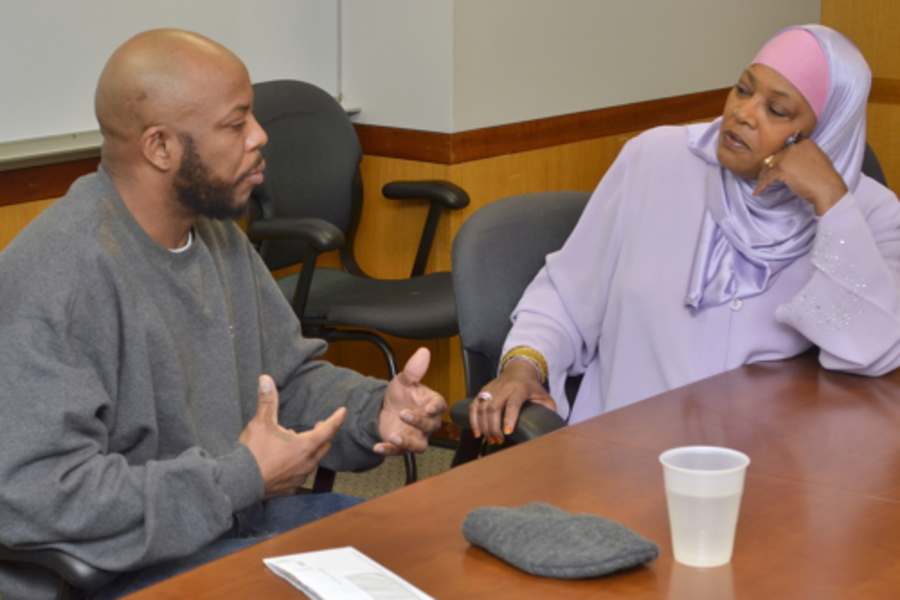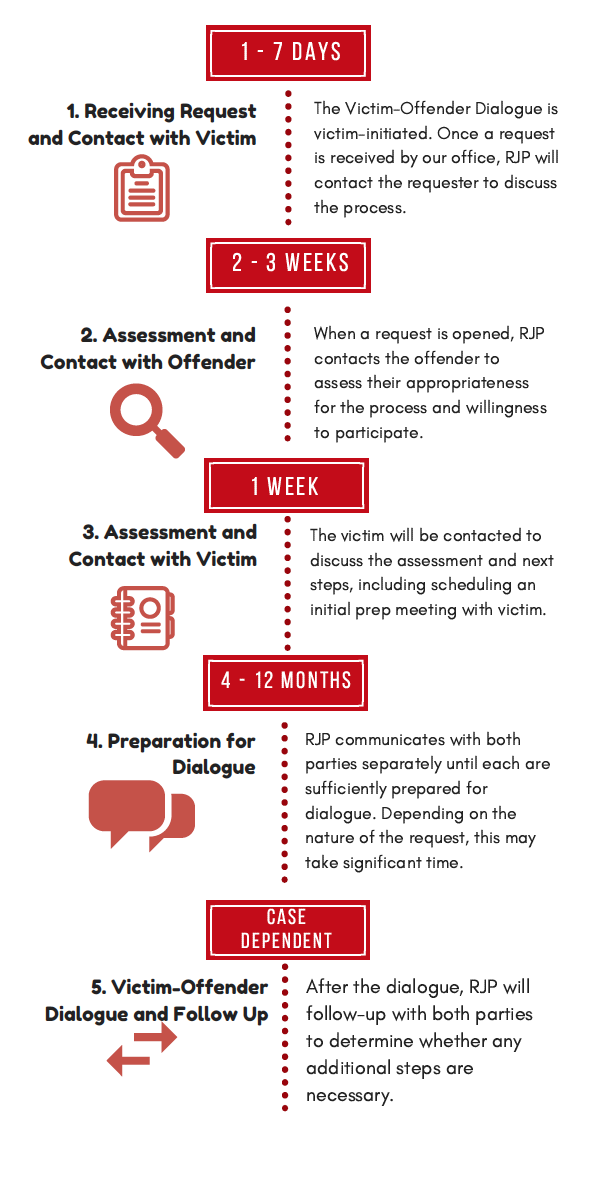What is Victim-Offender Dialogue?
This is an opportunity for victims and survivors to have their questions answered regarding an offense as well as let that person know the impact the crime has had on victims’ lives.
Victim-offender dialogue is completely voluntary throughout, and both parties can withdraw from the process at any time. If you are interested in learning more about the process and discussing whether it may be helpful for you, contact RJP here.
Why would a victim or survivor want to meet with an offender?
 Victim-offender dialogue is a facilitated process that allows a crime victim or surviving family member to meet with the individual who committed a crime against them in a safe, structured setting.
Victim-offender dialogue is a facilitated process that allows a crime victim or surviving family member to meet with the individual who committed a crime against them in a safe, structured setting.
The answer to the question of what brings someone to this process is different for each person, but typically falls into three main categories:
- Some victims want information about the offense and the offender. People trying to put the pieces together or understand what happened after a serious crime may have holes in the story of the offense and want the offender to help them fill in the blanks on why and how it happened. Frequently, the offender may be the only person with the answers to those questions. This often includes wondering what led up to the incident and what happened after. Additionally, victims and survivors may want to know more about the offender and his or her life. They may want to know how a person got to a place where they could commit this crime, what kind of person the offender is, and if he or she is sorry or remorseful about the offense. There may also be interest in what an offender’s life has been like after the offense, either in prison or out in the community.
- Some victims want to talk about the impact of the crime. The long-term impacts of a crime are often what is the most painful for the victim. They may want to tell the offender about the pain and loss they have endured, how their lives have been changed, and what life has been like for them since the crime occurred. As much as it is important for some victims to understand what an offender did and why, it is often as important for them to be able to express to an offender what his or her actions mean to them and their lives. Even if a victim or family member gave a victim impact statement at sentencing, often that is a very brief summary of what a person had experienced at that time and does not capture the full scope of the harm since the offender left the courtroom. For those dealing with the aftermath of a serious and traumatic crime, the pain and questions may linger for years or decades afterwards and it is important for an offender to understand that vast scope.
- Repairing harm/creating positive outcome. Sometimes victims have an idea of something that the offenders could do to help fix some of the harm they caused. This could be anything that would make something positive come out of the pain caused by the offense, often described as making meaning out of what happened.
Who can request this process?
A victim or surviving family member who has reached 18 years of age can request a victim-offender dialogue. The term “victim” is broadly defined under Wisconsin law and includes the person whom a crime was committed against as well as the parent or guardian of a child victim. Additionally, if the direct victim is deceased, any family member or person who lived with the deceased is considered an eligible victim.
We serve any victim of a serious or sensitive crime (state or federal) whose offender is incarcerated, on supervision in Wisconsin or living in Wisconsin. We have worked with victims and surviving family members living all across the country. Apply for victim-offender dialogue.
Victim-offender dialogue process at a glance
View a PDF of the victim-offender dialogue process at a glance (PDF)

Frequently Asked Questions
When can I request a victim-offender dialogue?
We believe that victim-offender dialogue should be available at any point in the criminal justice process that a victim/survivor wants to participate; whether it is months, years, or decades after an offense occurred.
What if I don’t want to meet with the offender face-to-face?
In addition to the face-to-face dialogue meetings, we are also able to conduct facilitated dialogues by letter, phone, and video conference.
How likely is it that my offender will be willing to meet with me?
The majority of offenders we reach out to regarding this process do agree to participate or at least to meeting with us to discuss the program and what a victim or surviving family member is hoping to get out of the process.
Why would an offender agree to participate in the process?
Some offenders want to apologize to their victims/survivors and to express remorse for the crimes they committed. Answering questions honestly and providing the desired details about an offense can be a way for an offender to take responsibility for the harm that he or she has caused. An offender may also want to present a more complete picture of who they are compared to what was presented in court. Participation may also be a starting point of an offender’s attempt to make amends.
Does participation in this program affect a person's sentence?
No, participation in this process does not reduce or alter the length of a person's sentence.
What if my offender is deceased or unwilling to meet?
In the event that a person’s specific offender is now deceased or is unwilling to participate in the victim-offender dialogue process, there may be the option of meeting with an offender who has committed a similar offense that has participated in our program in the past.
The judge imposed a no-contact provision on the offender or there is a rule of supervision preventing contact, can I still request this process?
This is something that we will examine in each case to determine whether the offender can participate in the victim-offender dialogue process. In some cases, eligibility for participation may require the no-contact provision or rule be modified strictly for the purposes of this process with either the court or the Division of Community Corrections.
Where do the dialogue meetings take place?
If the offender is incarcerated, the face-to-face meeting would take place at the institution where the offender is located. If the offender is on supervision or living in Wisconsin, the meeting would take place at a safe, neutral location that the parties are comfortable with. Parties are also able to have a support person present with them during the meeting if they choose.
How long does the process take?
Depending on the nature of the case and the dynamics involved, the preparation process for each victim-offender dialogue request varies greatly from several months up to a year or longer. We take great care to make sure that both parties are sufficiently prepared for the meeting and that it will be as productive as possible.

